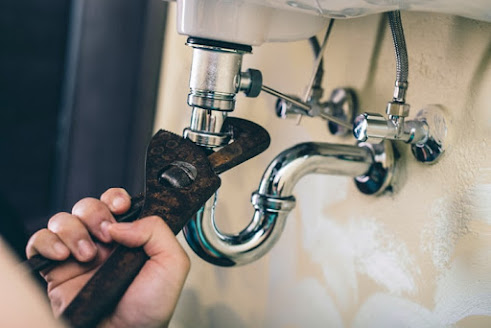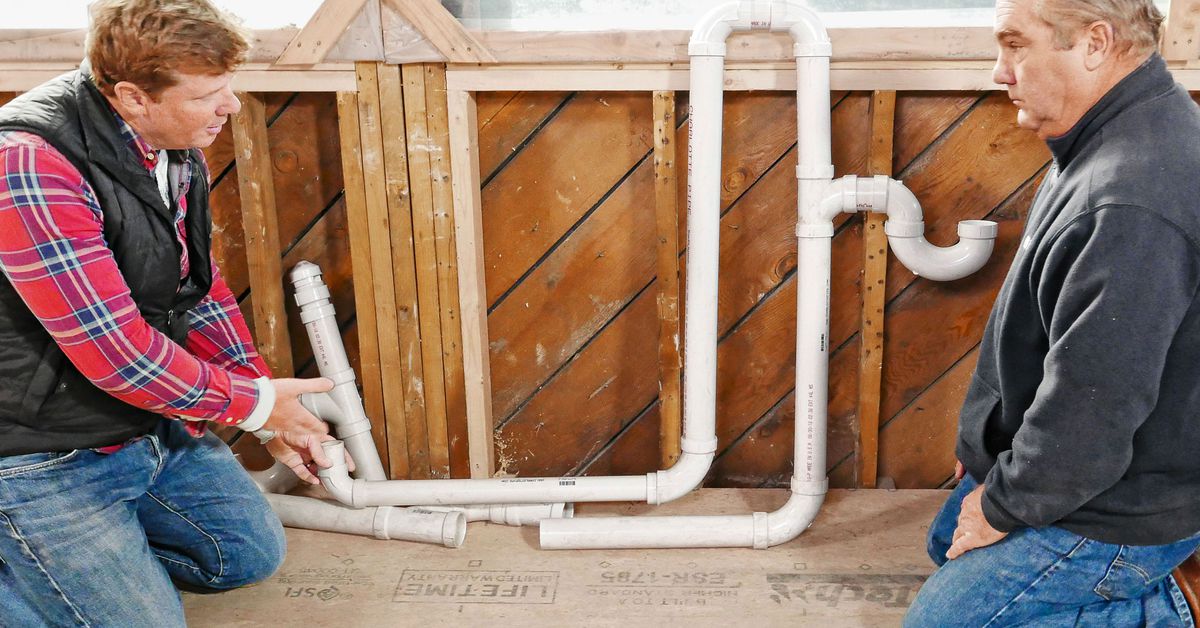How do you really feel with regards to Why is My Home Making Strange Plumbing Noises?

To detect loud plumbing, it is essential to figure out initial whether the unwanted noises take place on the system's inlet side-in other words, when water is turned on-or on the drainpipe side. Sounds on the inlet side have differed reasons: excessive water stress, used valve and tap components, incorrectly attached pumps or other devices, improperly put pipeline fasteners, as well as plumbing runs containing a lot of tight bends or various other limitations. Sounds on the drain side usually come from inadequate place or, similar to some inlet side noise, a format including limited bends.
Hissing
Hissing noise that takes place when a faucet is opened a little typically signals too much water pressure. Consult your neighborhood water company if you presume this problem; it will certainly be able to tell you the water stress in your area and also can install a pressurereducing shutoff on the inbound supply of water pipeline if necessary.
Thudding
Thudding noise, usually accompanied by trembling pipelines, when a faucet or home appliance shutoff is turned off is a problem called water hammer. The noise as well as resonance are caused by the reverberating wave of stress in the water, which unexpectedly has no area to go. In some cases opening a shutoff that discharges water rapidly right into an area of piping including a limitation, joint, or tee fitting can generate the same condition.
Water hammer can normally be cured by installing installations called air chambers or shock absorbers in the plumbing to which the issue shutoffs or faucets are connected. These gadgets permit the shock wave created by the halted flow of water to dissipate airborne they have, which (unlike water) is compressible.
Older plumbing systems might have brief upright areas of capped pipe behind walls on faucet runs for the same objective; these can at some point loaded with water, minimizing or ruining their efficiency. The treatment is to drain pipes the water supply totally by turning off the main water supply valve and also opening up all taps. Then open the main supply shutoff and also shut the faucets one at a time, beginning with the tap nearest the shutoff as well as finishing with the one farthest away.
Babbling or Shrieking
Intense chattering or screeching that occurs when a valve or faucet is activated, which generally goes away when the installation is opened completely, signals loosened or malfunctioning inner components. The service is to replace the valve or tap with a brand-new one.
Pumps as well as home appliances such as washing devices and dish washers can move electric motor noise to pipes if they are improperly attached. Connect such products to plumbing with plastic or rubber hoses-never rigid pipe-to isolate them.
Other Inlet Side Noises
Squeaking, squealing, scratching, breaking, as well as tapping normally are triggered by the development or tightening of pipes, usually copper ones supplying warm water. The noises happen as the pipes slide versus loosened fasteners or strike neighboring house framework. You can typically pinpoint the area of the problem if the pipelines are exposed; simply comply with the audio when the pipes are making sounds. Probably you will find a loose pipeline hanger or a location where pipes lie so near flooring joists or various other framing items that they clatter against them. Attaching foam pipeline insulation around the pipes at the point of call must remedy the trouble. Make sure straps as well as hangers are safe and secure as well as give appropriate support. Where feasible, pipe bolts ought to be affixed to enormous structural aspects such as foundation wall surfaces instead of to mounting; doing so lessens the transmission of resonances from plumbing to surfaces that can magnify and move them. If attaching bolts to framework is unavoidable, cover pipelines with insulation or other durable product where they contact fasteners, and also sandwich the ends of new bolts in between rubber washers when installing them.
Dealing with plumbing runs that deal with flow-restricting tight or various bends is a last resource that should be carried out just after getting in touch with a skilled plumbing professional. Regrettably, this scenario is rather common in older homes that might not have actually been constructed with indoor plumbing or that have seen a number of remodels, particularly by beginners.
Drain Sound
On the drain side of plumbing, the principal objectives are to eliminate surface areas that can be struck by dropping or rushing water and to protect pipelines to have unavoidable noises.
In brand-new building and construction, bathtubs, shower stalls, bathrooms, as well as wallmounted sinks and also basins ought to be set on or against resistant underlayments to lower the transmission of sound with them. Water-saving bathrooms and also taps are less loud than conventional models; mount them instead of older types even if codes in your area still permit utilizing older components.
Drains that do not run vertically to the basement or that branch into horizontal pipe runs sustained at flooring joists or various other mounting existing specifically troublesome noise problems. Such pipes are big enough to emit significant resonance; they additionally lug substantial quantities of water, that makes the situation worse. In new construction, define cast-iron dirt pipelines (the huge pipelines that drain pipes commodes) if you can manage them. Their enormity has a lot of the sound made by water travelling through them. Additionally, stay clear of transmitting drains in wall surfaces shown to rooms and also areas where individuals collect. Walls containing drains need to be soundproofed as was defined previously, using double panels of sound-insulating fiberboard as well as wallboard. Pipes themselves can be wrapped with special fiberglass insulation produced the function; such pipes have an invulnerable plastic skin (often consisting of lead). Outcomes are not constantly adequate.
Pipe Down! What to Do About Noisy Water Pipes
Banging
Does it sound like someone's hitting your pipes with a hammer every time you run water? The issue could be a phenomenon called water hammer, which happens when a water valve closes suddenly. You'll often hear it when your washing machine stops filling, for example. The momentum and pressure from the water flowing toward the valve create the shockwave that causes the banging noise when the valve closes suddenly. It might not seem like a big deal, but water hammer can cause damage to your pipes, including leaks and joint damage.
One way to ease water hammer is by installing water hammer arrestors. Your plumber can install them near major valves to help cushion the shock of the water when it suddenly stops or changes direction. You might also need to reduce the water pressure coming into your home with the pressure-reducing valve.
Gurgling
Gurgling sounds typically come from drainpipes. This sound happens when the water can't drain properly, usually when there's a clog in the water pipes. Drain clogs often happen due to hair, grease, soap scum or objects that fall down the drain. They can happen suddenly or build up slowly over time.
You can sometimes clear a clogged drainpipe with a plunger to help force the clog through the pipe. A plumbing snake or an auger can also help break up tough clogs. A common plumbing myth is that chemical drain cleaners are safe and effective, but they often don't work and contain harsh chemicals that can hurt you and your plumbing. If you can't remove the clog with a plunger or snake, it's best to call a plumber to help.
Rattling
Water travels through your pipes with lots of pressure, so the pipes are bound to move a little. Pipes should be secured well to keep them from moving too much when water runs through them. If they're not properly fastened or the fasteners come loose, you might hear them rattling when you run water.
Resecuring the pipes can cut down on the rattling noise and prevent damage to the joints of the water pipes. However, many pipes run behind walls where you can't easily access them. A plumber can help determine if loose fasteners are the cause of the rattling and resecure them if necessary.
Humming
If your pipes sound like they're humming, it's likely a water pressure issue. When the water pressure is high, it can cause the water pipes to vibrate and create a humming sound. High water pressure is more common if you have a well for your water, but it can happen with municipal water as well. High water pressure can damage your plumbing and cause leaks.
If you have a well, check the pressure to ensure it's below 55 pounds per square inch. A plumber can test the pressure for you and help adjust the issue if you're not sure how to do it yourself. If you're connected to the municipal water source, your home likely has a pressure-reducing valve near where the water enters your home. You can adjust the screw in the valve to decrease the pressure, but be careful not to lower it too much.
Squeaking
Squeaking or squealing is another common sound you'll hear in your water pipes. This often happens if small components within the plumbing, such as washers or aerators, become loose, dirty or damaged. When this is the cause, the squeaking sound is usually confined to a certain fixture or area of plumbing. Replaced or repairing the part should solve the noise.
If you can hear the squealing sound everywhere in your home, it could be an issue with water pressure. Buildup in the pipes narrows the space for the water, which can cause squealing as the water tries to squeeze through the pipes. Wear and tear on the plumbing system can also cause whistling or squeaking. These situations typically require a professional plumber to diagnose and repair.
https://www.homeserve.com/en-us/blog/home-improvement/water-pipes-making-noise/

I stumbled upon that page about How To Fix Noisy Pipes while doing a lookup on the web. Sharing is good. One never knows, you may very well be helping someone out. I thank you for reading our article about Why Do My Pipes Make Noises.
Book An Appointment